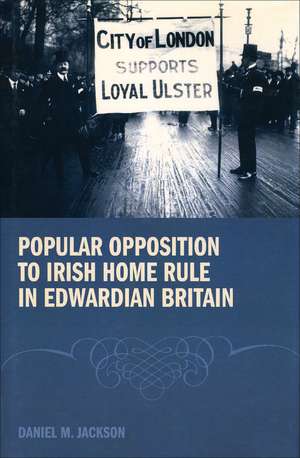Popular Opposition to Irish Home Rule in Edwardian Britain
Autor Daniel Jacksonen Limba Engleză Hardback – 31 mar 2009
This groundbreaking volume sheds light on the complex realities of British politics prior to 1914, showing that from the start of the Third Home Rule Bill crisis, there was considerable popular interest in the Irish issue. Isolating this movement at the end of the long nineteenth century, where communal and confessional identities were just as powerful as class, and native hostility to Catholicism and Irish migration still prevailed, Daniel Jackson demonstrates the power of the enormous Home Rule protests in Britain. Through studying these massive demonstrations, the author captures the opinions of those made voiceless by history and explores how the Ulster question allowed Conservative politicians to gain popular enthusiasm and bridge the gap between elites and the masses.
Preț: 400.08 lei
Nou
Puncte Express: 600
Preț estimativ în valută:
76.57€ • 79.64$ • 63.21£
76.57€ • 79.64$ • 63.21£
Carte disponibilă
Livrare economică 24 martie-07 aprilie
Preluare comenzi: 021 569.72.76
Specificații
ISBN-13: 9781846311987
ISBN-10: 1846311985
Pagini: 256
Ilustrații: 14 halftones
Dimensiuni: 156 x 234 x 19 mm
Greutate: 0.61 kg
Editura: Liverpool University Press
ISBN-10: 1846311985
Pagini: 256
Ilustrații: 14 halftones
Dimensiuni: 156 x 234 x 19 mm
Greutate: 0.61 kg
Editura: Liverpool University Press
Notă biografică
Daniel Jackson works in policy development in local government. He has contributed articles to a number of journals including Transactions of the Historic Society of Lancashire and Cheshire.
Cuprins
Introduction. Ancient prejudice: popular politics, social geography and ‘no popery’ in Edwardian Britain
1. The lesson of Craigavon. Orange Ulster anticipates Nuremberg
2. ‘Liverpool, sister of Belfast’. Protestant Ulster’s Lancashire bridgehead
3.Echoes of Milothian. Sir Edward Carson’s first tour of Great Britain
4. ‘Stoutly and robustly Protestant’. The religious dimension of Ulster’s appeal
5. The transfiguration of Sir Edward Carson. Unionist demonstrations reach their high-water mark
6. Firing the heather. Rousing support for Ulster throughout Great Britain
Conclusion. Ulster, crowds and Britishness
1. The lesson of Craigavon. Orange Ulster anticipates Nuremberg
2. ‘Liverpool, sister of Belfast’. Protestant Ulster’s Lancashire bridgehead
3.Echoes of Milothian. Sir Edward Carson’s first tour of Great Britain
4. ‘Stoutly and robustly Protestant’. The religious dimension of Ulster’s appeal
5. The transfiguration of Sir Edward Carson. Unionist demonstrations reach their high-water mark
6. Firing the heather. Rousing support for Ulster throughout Great Britain
Conclusion. Ulster, crowds and Britishness
Recenzii
"One of the most important studies in British-Irish history to be published this decade."
"This is an excellent study of an important and neglected dimension of pre-World War One Britain. It will fill a serious gap in the existing scholarship on early twentieth-century politics and culture and will represent an important contribution also to the study of national identity and ethnic conflict in the UK."
